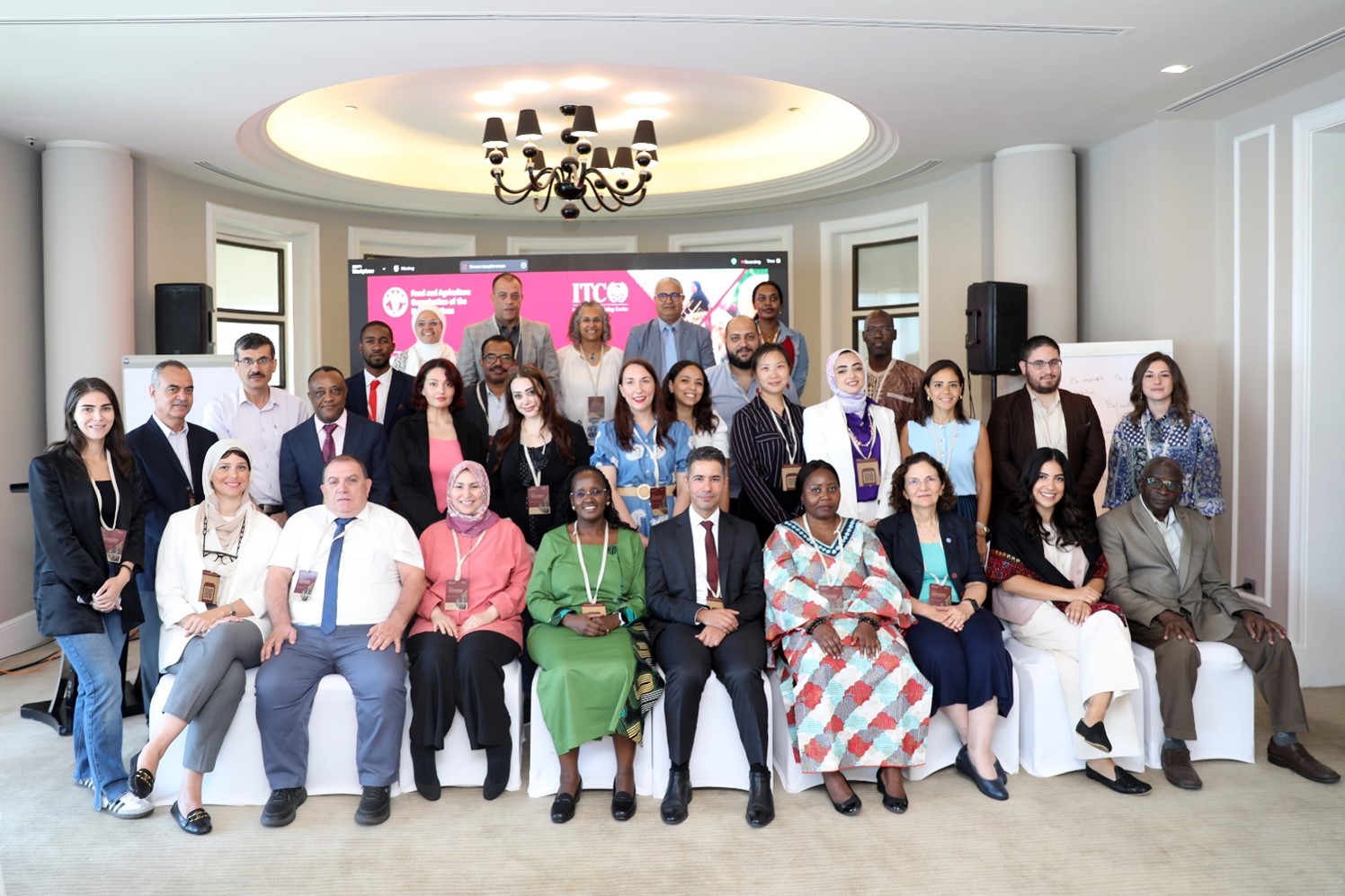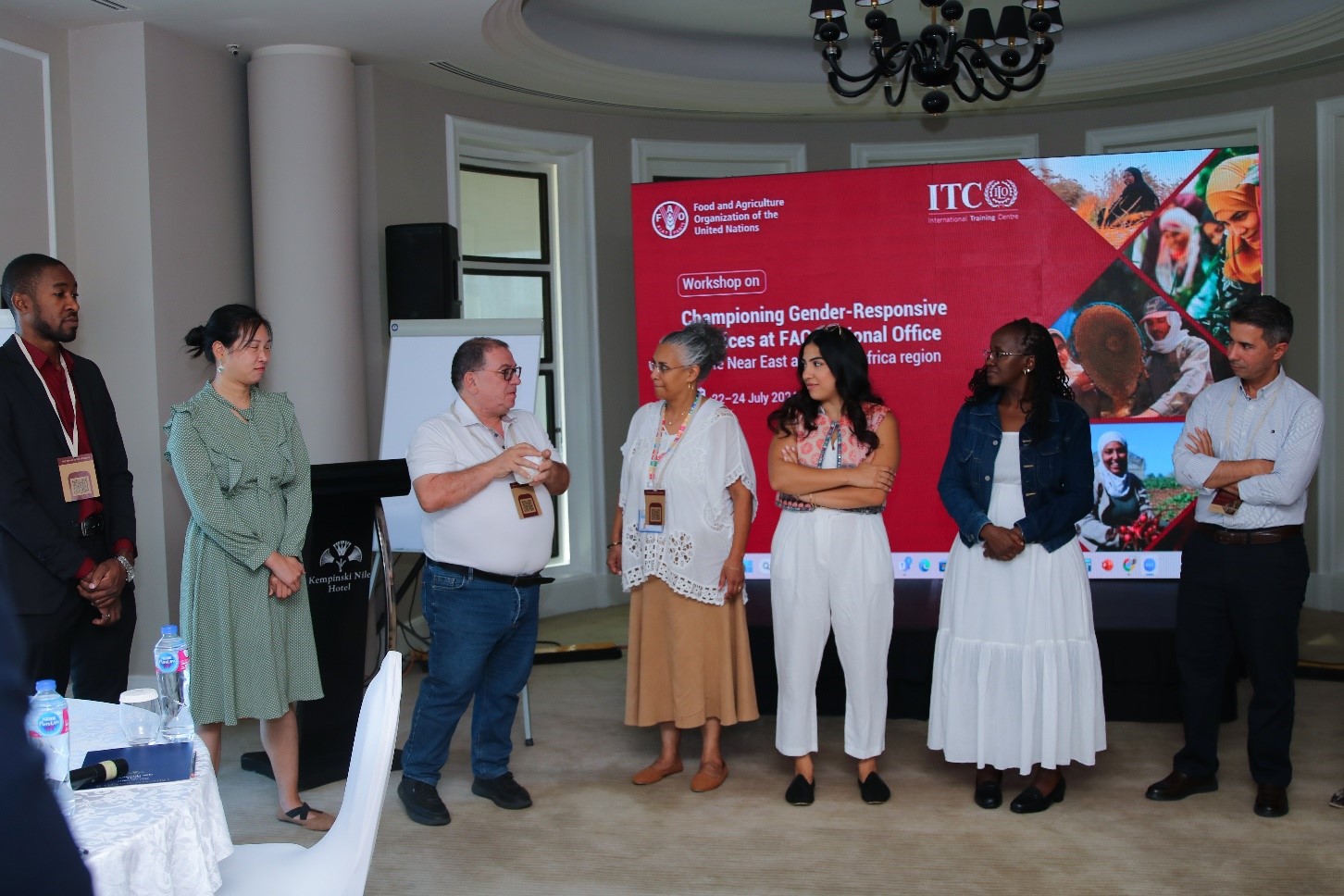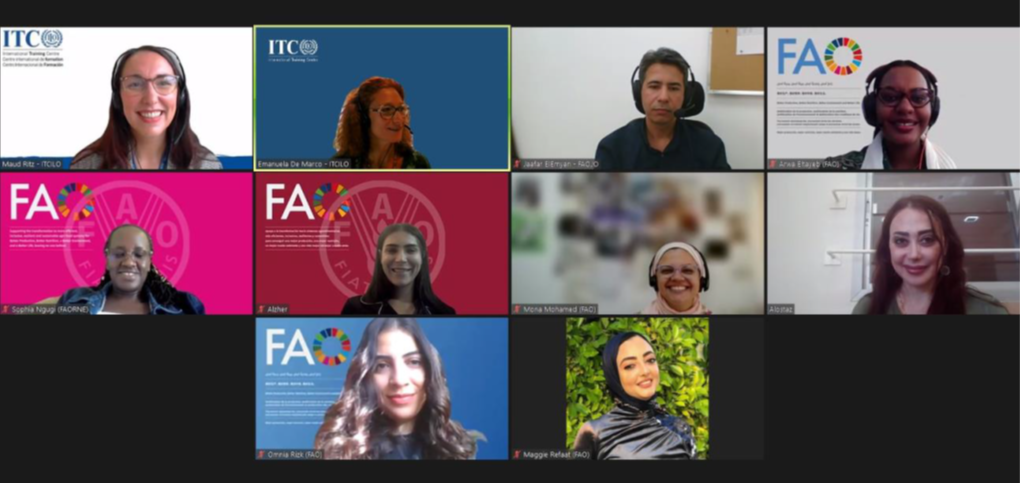
Championing gender-responsive practices: Regional capacity-strengthening for FAORNE
15/12/2024
The FAO regional office for the Near East and North Africa (RNE) is guided by the shared global mission and regional vision: to achieve sustainable food security for all and to help vulnerable communities cope with and recover from shocks and crises while ensuring Gender equality. Gender equality is not only a matter of fairness and justice but also essential for achieving the mission and maximising the organization impact. By fostering a culture of gender responsiveness, the staff are better equipped to meet the diverse needs of the communities that FAO serves and drive sustainable development in the region.
FAORNE’s vision and priorities on gender equality are articulated in the recently launched Regional Gender Strategy and Action Plan. However, having a strategy does not automatically translate into action if staff and other stakeholders are not equipped with the needed skills to implement it; thus, enhancing the capacity is critical.
Building capacity through gender mainstreaming training
As a step towards creating more champions of gender-responsive practices, the gender unit at FAORNE, with support from ESP colleagues, capacity building project themed “Championing gender-responsive practices at FAORNE.” FAORNE partnered with ITCILO to deliver a series of gender mainstreaming workshops and trainings, focusing on empowering FAO staff to promote gender equality in agrifood systems. The programme aimed to strengthen gender mainstreaming within FAO’s operations and support the development of gender-responsive action plans across various countries in the FAORNE.
The program involved face-to-face training on gender mainstreaming held in July 2024 at Cairo, a 2.5-hour online session on gender-responsive leadership, and a four-day Distance Learning on Gender-sensitive results-based management workshop in Sept. The training sessions engaged technical program staff within FAO at the country and regional levels.
The energetic face-to-face workshop, opened by Regional ADG Abdulhakim Elwaer and Senior Program Officer May Hani, was attended by 23 technical program staff. It covered gender equality concepts, gender mainstreaming in the FAO project cycle, gender-responsive partnerships, and stakeholder engagement. Participatory sessions encouraged staff to question, share, and learn through activities and real-life scenarios.

Appreciating that promoting gender equality is not just a personal commitment but a formal responsibility for leaders at various levels within the FAO, an online session on gender-responsive leadership was conducted in September 2024. Guided by the FAO and other global policies and commitments within the broader UN Policy framework, the session focused on different scenarios leaders face and how to ensure gender inclusion in the workplace. During this session, the FAO/ITCILO partnership also benefitted from the Folke Bernadotte Academy (FBA) participation, which contributed and brought additional expertise on gender-responsive leadership. The session emphasized the responsibility of leaders to foster an inclusive work environment and integrate gender equality into policies and projects. Participants explored scenarios and discussed how they would address biases and social norms hindering gender inclusivity.
The Distance Learning (DL) program component focused on gender-sensitive results-based management as a follow-up to the face-to-face training. The DL sessions equipped participants from five FAO Country offices – Sudan, Jordan, Iraq, Syria, and Palestine - with practical tools and knowledge to integrate gender-responsive approaches and implement the new FAO’s Regional Gender Strategy at the national level. Over four half-day sessions, participants engaged in interactive sessions covering problem and context analysis, defining outcomes and outputs, accountability frameworks, and stakeholder engagement. By the end of the program, participants had developed draft national gender action plans aligned with the regional strategy to guide their program work and incorporate gender-responsive approaches in their programs.

Participants in the Distance learning sessions
Fostering gender champions in the NENA region
The capacity-building sessions equipped staff with the necessary skills to achieve gender-responsive and, when possible, gender-transformative results in programs. Staff indicated having recognised immediate actions that they incorporated.
“The training was an excellent reminder of how gender mainstreaming improves the value and impact of our work. I went back to a project I was developing, and added tailored support for women, acknowledging the additional barriers they face in establishing and leading an enterprise beyond ensuring their representation as beneficiaries.” Dalia Abulfotuh (FAORNE)
Antonio Youssef from FAO Lebanon said, “I used the acquired knowledge in discussing and preparing concept notes or proposals. Gender mainstreaming into the FAO project cycle became an approach I followed and applied”.
On the other hand, Kane Oumar from the Mauritania country office indicated that this training helped him better support the project work in the country: “I learned how to write gender indicators correctly. Just after returning from training, I took over all our current projects to check that the indicators were well written and correct those with weaknesses,” he said.
The training sessions made a significant step in engaging more FAO Staff as champions in advancing FAO’s commitment to gender equality in the NENA region. The sessions targeted staff with program design and implementation roles, thus getting more staff in addition to the gender focal points to champion the work of gender equality.
As May Hani noted, “I appreciated that the training was not directed at the Gender Focal Points level, but rather emphasised that gender equality should be part and parcel of our collective responsibility as technical staff of FAO regardless of topic or level of commitment.”
Therefore, the training sessions were an essential step in supporting countries advancing gender equality work and meeting the FAO gender minimum standards. Meeting the gender minimum standards is not just the right thing to do; it is also important in achieving the overall FAO mandate and ensuring no one is left behind.
Fostering gender champions in the NENA region
The capacity-building sessions equipped staff with the necessary skills to achieve gender-responsive and, when possible, gender-transformative results in programs. Staff indicated having recognised immediate actions that they incorporated.
“The training was an excellent reminder of how gender mainstreaming improves the value and impact of our work. I went back to a project I was developing, and added tailored support for women, acknowledging the additional barriers they face in establishing and leading an enterprise beyond ensuring their representation as beneficiaries.” Dalia Abulfotuh (FAORNE)
Antonio Youssef from FAO Lebanon said, “I used the acquired knowledge in discussing and preparing concept notes or proposals. Gender mainstreaming into the FAO project cycle became an approach I followed and applied”.
On the other hand, Kane Oumar from the Mauritania country office indicated that this training helped him better support the project work in the country: “I learned how to write gender indicators correctly. Just after returning from training, I took over all our current projects to check that the indicators were well written and correct those with weaknesses,” he said.
The training sessions made a significant step in engaging more FAO Staff as champions in advancing FAO’s commitment to gender equality in the NENA region. The sessions targeted staff with program design and implementation roles, thus getting more staff in addition to the gender focal points to champion the work of gender equality.
As May Hani noted, “I appreciated that the training was not directed at the Gender Focal Points level, but rather emphasised that gender equality should be part and parcel of our collective responsibility as technical staff of FAO regardless of topic or level of commitment.”
Therefore, the training sessions were an essential step in supporting countries advancing gender equality work and meeting the FAO gender minimum standards. Meeting the gender minimum standards is not just the right thing to do; it is also important in achieving the overall FAO mandate and ensuring no one is left behind.
